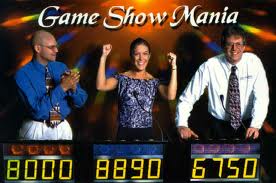Game Shows, Results and Quality

We have often thought Game Shows are a great metaphor for different forms of Monitoring and Evaluation methods. Haven’t you?
In Mastermind, order Who Wants to Be a Millionaire, prescription Rockwiz or QI correct factual answers are rewarded. A bit like the idea of ‘Cash on Delivery Aid’.
The Amazing Race is task driven with intermediary outcomes, drugstore has a clear goal, and is competitive but team based. A nested log-frame approach perhaps?
In Renovators or the Block participants’ performance is ultimately based on what they can sell their renovated property for. The show uses the measure of the market to judge the quality of performance, which is reminiscent of many studies assessing the effect of aid on growth.
Master Chef uses judgement of quality by ‘experts’ who then rank participants and sometimes score their performance. This is a great example of peer assessment, based on experience, ‘taste’ and presentation, the criteria for which are not always clear. Not unlike how some of the articles for publications like the ‘Journal of Development Effectiveness’ are assessed (psst we should know we’ve reviewed some of them!).
Dancing with the stars, like ice dancing or diving, involves expert judgement but with high levels of inter-subjective agreement between judges. Dancing with Stars also has an element of citizen participation. Experts provide views that then lead to the worst candidates being selected and the public chose between them.
Big Brother takes this further of course with participants and citizens involved in voting using ICT4D. Quality criteria are really not defined at all. This is a clear example of Voice, Loyalty and Exit options as described by Hirschman.
But the show that is probably closest to development is the Eurovision song contest. There are high degrees of domestic engagement and ownership in shaping the offering; harmonization has led to high degree of mono-tone glitter and ersatz pop, but sometimes if you break out of the norm you are sometimes rewarded – remember Hard Rock Hallelujah by Lordi from Finland in 2006? In the end results are determined by the voting of individual nations which is based on complex multi-criteria analysis based on geography, politics, culture, song, clothes etc. Some of which is predictable- i.e. Turkey and Greece don’t often vote for each other, but much of it delights those who are ‘seeking surprise’. Aggregation is based on un-weighted addition of individual scoring and mutual accountability is ensured by long memories.
Happy Christmas to All
From Chris, Rosalind, Irene, Brendan, and Cathy (and thanks to Patricia Rogers for her thoughts on this too!)
Comments are closed.